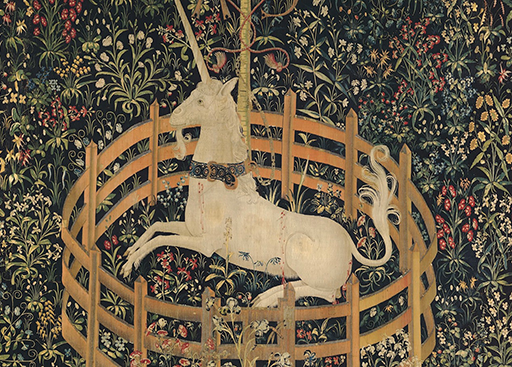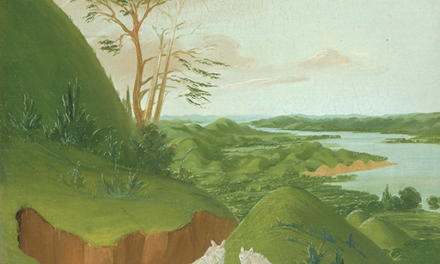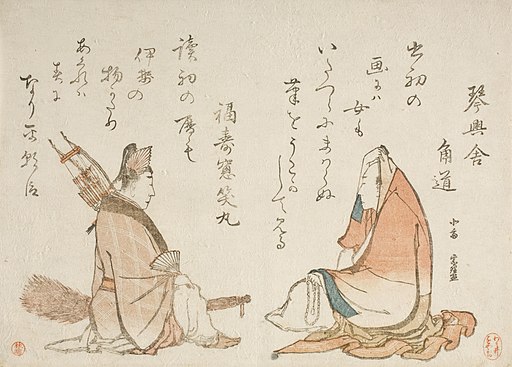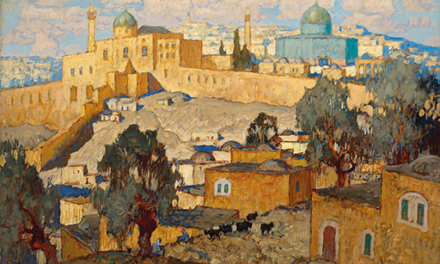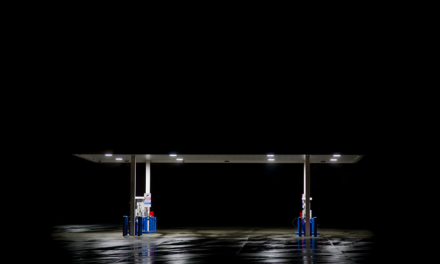The Unicorn Rests in a Garden (from the Unicorn Tapestries). 1495, The Met Cloisters, New York.
The Samoyed
by Anca Szilágyi
“Modern art is fine for decor,” he said, popping a vodka-soaked olive into his mouth. “But I don’t find it meaningful.” His lips were full, his eyes a gelid blue, his jaw-line well-defined with a stubble that seemed to Jane too calculated. Behind him hung a monumental painting spattered with gray, white, and red; she thought it might be a Pollack, which seemed odd in a nightclub. She’d used it as an opening. She’d said to him, in a sentence she immediately regretted for its banality and for the reaction it now received, “That’s some painting.” All the walls in the club gleamed black.
He introduced himself as Robert – not Rob, Bob, or, mercifully, Robbie. As the bulge of the olive rolled up and down his cheek, she told him she had just taken a summer class on medieval art and architecture. She spoke to his eyes, his jaw, and his burgundy V-neck t-shirt. Hybrid silk, almost liquid. “Nave” was her new favorite word, she told him, followed closely by “buttress.” He smiled—politely, she thought— and said he liked all kinds of pretty people and she was pretty and did she want to dance. She did. They drained their glasses.
She wasn’t one to dance much in New York. The cover charges—twenty, thirty dollars— seemed prohibitive. At college, up in Montreal, she never needed to spend more than five. But late that spring, halfway through her undergraduate career, she’d made it her goal to explore new horizons. Life was short, after all. She’d been sick the year before but had survived. Now it was summer and she had time on her hands, so she coughed up forty dollars—to see another segment of society, she told herself. The club website, blaring “Lebanese Blonde,” had advertised global music. Appealing enough.
Electronic music played with gypsy twangs. Occasionally, she shook her hips the way she’d seen it done at a belly dance show. Or tried, at least. Her hips were not particularly voluptuous. A skirt of coins would’ve been a good accessory if she were to accomplish anything remotely resembling what she’d seen. The heavily cloaked tribal dancers at the show had been preferable to the sequins and big smiles of the cheesy cabaret-style performers. None of it would be right here.
Robert smiled, she smiled. They danced. Perhaps the horizon-expanding goal had spiraled out more decisively from New Year’s. She’d gone dancing somewhere south of Greenpoint, in a former factory that the fire department continually threatened to shut down. Her grandfather was dying, and her brother Beau had spent days and days with him in the hospital. He’d needed a break. In the factory dance club, she’d met a painter whose day job was writing ad copy. By day he wrote of chocolate bars, and by night he painted toilets. Grim portraits, in green and yellow and gray mottled tones. Back at college that year, she exchanged emails with him. She found his writing so peculiarly earnest and strangely polished that she didn’t want to see him again. But the experience of it, throwing herself into new situations like that, worked against a certain fear she had of laying very still and withering. She didn’t think her friends would be interested in an expensive, more or less mainstream nightclub. So here she was, dancing in midtown Manhattan, alone. Well, not alone. There was Robert.
An opalescent locket hung at her sternum. Inside jangled a large antibiotic pill. “I’m getting over bronchitis,” she told him, surprised she wasn’t hacking up balls of yellow mucous in a heap on the floor. She excused herself and went to the ladies’ room. Alone, away from anyone she knew, it was a perfect night for pretending: in view of a woman applying heavy coats of mascara to her lashes, she swallowed the pill with a certain air of mystery and managed not to gag. She returned to the dance floor with cold wet lips.
“Is it safe to kiss?” he asked. She admired his apparent carelessness, his willingness to contract an upper respiratory infection. If she learned he was getting over bronchitis, kissing would not be up for discussion, even if he claimed he was beyond the point of contagion.
“Yes, I suppose it is.” Tempted to say, instead, “But when is it ever?”
They danced closer. She pinched his shirt, which she had been curious about from the start, soft and slippery. “I like this,” she said, almost in his ear. His chest appeared smooth. She wondered if he waxed; he probably didn’t have much to wax. They sweated, but arctic drafts blew down on them, so they danced closer.
“Are you a swimmer?” she asked. One eyebrow arched; they were dark compared to his cold bright blond hair.
“I do swim,” he said. “Not competitively.”
“You have a swimmer’s body,” she said. It was almost a shout, the music was so loud.
“Thank you,” he said, almost immediately. So they were both compliment-eaters, she thought. “You don’t swim,” he said. “But I bet you dance.”
“Martha Graham,” she said. “My favorite teacher always says that if hurts and feels wrong, you’re doing it right.”
He smirked. They slipped out of the crowd toward the exit and exchanged phone numbers. Her walk to the subway in the hot gritty night grew giddy, staccato.
II.
What bothered her more about the Graham technique, more than the pain or the feeling wrong, was the feeling of exposed bones. She’d told her friend Pamela about this, how in certain positions a femur or a pelvis felt naked of flesh; Pamela furrowed her brow as if Jane had shown her a fungal toenail. She suggested asking the teacher whether that feeling should be the case. Jane said she’d rather not. It was a large class, full of real dancers, with real dancer bodies, all ribcage and ropy muscle, and she mostly hid in the back with those for whom it was more a hobby than any real-life aspiration. Whose bellies or arms, in certain exercises, shook. Though once, in the dream life of adolescence, it had been an aspiration. In Montreal, she and Pamela had taken a workshop on improvisation together; Pamela had, perhaps inadvertently, but perhaps not, called her movements pedestrian. Prickly Pamela. Thereafter, Jane focused on learning others’ choreography.
The next Saturday, she met Robert on the steps to the Metropolitan Museum of Art. A chilly June afternoon, unusual for New York, reminiscent of Montreal’s unpredictable summers. A cool breeze raised the light hairs on her forearms. Goose-flesh is a much better word than goose-bump, she thought as she climbed the shallow granite steps. There were two exhibits that she wanted to see: the medieval tapestries, moved down from the Cloisters and hopefully appealing to his apparently old-fashioned sensibilities, and Piet Mondrian. A fair exchange, she thought. She didn’t know why she found Mondrian pleasing. But that was the fun of it. Maybe, in trying to explain to Robert how it was more than “decoration” (and anyway, what were tapestries?), she would start to understand it herself. Was there anything in the art beyond the neat black lines, the array of gold and red and blue rectangles?
They visited the tapestries first. A docent led a group through the galleries. They didn’t join the group but sidled its periphery. The seventy-something guide wore rectangular, black-rimmed glasses and had neatly bobbed silver hair. Her persimmon shoes, slender suede flats with almost trapezoidal toes and a seam down the middle, were the “weird” sort of shoe her brother admired. They were clearly “designed” as opposed to merely manufactured. Her accent suggested an odd mix of Oxford, England and western Queens.
“Now the story of the unicorn could be read as an allegory for the life of Jesus, but it could also be taken for another allegory, that of the bridegroom.” In a large glass case beside a tapestry where the beast was hunted and speared, the horn of a narwhal gleamed. “To prove the existence of unicorns, men would drag back these tusks from poor old narwhals. The horn of a unicorn would have remarkable curative qualities, they claimed, for anything from rheumatism to insomnia to impotence.” Robert and Jane walked on into other rooms. The docent’s voice trailed behind them. “You could grind it up into a powder.” Jane imagined sprinkling narwhal horn powder atop her head, imagined coarse, white sand falling through a shaft of sunlight, an iridescent shower of skittering grains. As if to shake out the sand, she ran her fingers through her hair, a fine tangle of brittle curls.
After the tapestries came bejeweled containers for relics. One, ivory and arm-shaped, held a fragment of a saint’s radial bone. On and on the exhibit went, gold leaf and sapphire, bleeding hearts and pietàs. After exhausting the museum’s medieval collection, they rested on a stone bench in the long sky-lit hallway filled with Greco-Roman sculpture. The air lightened, became pleasingly cool and damp and seemed more breathable than in the medieval wing. Idly, they gazed at a finely chiseled torso of Herakles, whose legs and arms and head had been lost. A headless quadriplegic with an incredible six-pack.
“Want to go into the park?” she asked. She’d reached her point of saturation and couldn’t spend another minute in the galleries.
“Sure,” he said. She thought he would remind her of the Mondrian exhibit and ask whether she still wanted to see it. But why should he? They chose a swath of grass south of the museum. Both pale, both agreed readily to a shady spot beneath a willow.
“I like your shirt,” he said. She looked down at herself and admired her concoction. Black translucent cotton, with a mandarin collar and knotted cloth buttons. She’d thrown it over a cotton lavender sundress. Everything had been very cheap; she’d worried the shirt was visibly linty.
“Thanks,” she said. They each sat with their legs tucked behind them, hips on the cool grass. They leaned on their outstretched arms. An old man in dark sunglasses, a crushed hat and a dusty black trench coat sat on a bench twenty feet away. Swollen hands folded over the curve of his cane. Robert leaned in to kiss her. His lips felt meaty. Without regard to the daylight, the lack of alcohol, or the fact that they were in public, his hand slid up her dress. She leaned away, fingertips pushing at his breast, murmured, “But that man is right over there.” She wondered if perhaps the man was blind, or whether Robert had assumed he was, or whether he didn’t care at all. In any case, his eyes lost a certain sparkle they’d had just a moment ago, turning completely dull.
Her knees creaked as they stood and brushed off stray blades of grass. Already an old woman in her twenties. “Want to come over tonight?” he asked, eyes back to twinkling. “We could watch a movie.” And then, as if he’d read her previous thought, he added, “I’ve got a bottle of whisky.” Ah, but home, she’d learned that first night at the club, is Yonkers. And, she thought, I don’t want to spend the night in Yonkers. Maybe another time, she told him.
III.
The next evening she visited her brother. He was living in Williamsburg then, rooming with a Chilean designer. The designer owned three dogs: a large white Samoyed named Sammy, a Pomeranian, also white, named Kiki, and a brownish mutt named Sticky. The designer would sometimes forget to walk the dogs; Beau would let them loose in the small yard of their ground floor apartment, neatly enclosed with a very tall picket fence of unvarnished wood. They sat on the concrete of the patio while the dogs pranced and yapped and shit in the dirt. The dogs seemed ghostly in the dark, a blur of glowing fur and shining, roving eyes.
What set him off was unclear—some distant sound imperceptible to human ears, or perhaps the faint crackle of summer lightning—but Sammy, hulking ghost of a dog, reared up on his hind legs and scratched at the eastern wall of the fence, giving a long, keening howl, as if yearning for his native Siberia. Soon enough, Sticky joined Sammy. His bark was throaty: a deep and grating ululation. A small set of fleshy bells rattled in his esophagus. Kiki, apparently miffed, pattered inside, little claws tapping on the kitchen’s linoleum tiles; he circled the kitchen once before taking refuge under the futon.
“Down, Sticky,” said Beau. “Down, Sammy.” The mutt relented. The Samoyed’s howl wavered, diminishing to a high-pitched whine, then to a whimper, and then he put his snout to the ground and seemed to be searching for something far beyond the fence. After a silence, he nuzzled up to Sticky, tried to comfort himself with Sticky’s scent, but Sticky, tongue lolling, rejected Sammy’s advances and loped to a dark corner to nip at himself.
“I’m dating someone,” she said, finally.
“Oh?” Beau cocked an eyebrow. Her lips tightened.
“Well, okay, maybe not dating. But there have been dates. Two.” Always at the ready, she thought. Here it comes.
“Does he look like the shaved monkey?”
Lowering her chin, she looked down her nose at Beau. “No. I mean—blond, sure, but,” she shook her head, still looking down her nose, “No.”
“Good then.” Beau rose and fetched a plastic bag from inside. “Can’t take the smell of this shit anymore,” he grumbled to himself. In the yellow light spilling out from the apartment, the Samoyed, with a guilty look in his eye, had crapped on the concrete and slinked back inside with Sticky. Beau scooped it up. Whatever had been left on the packed dirt remained.
“Why do you put up with that? Why doesn’t she just walk her dogs? Or hire someone to do it?”
“Blah, blah. I don’t know. I won’t be here long.” He dangled the bag of excrement in front of him with only his thumb and index finger, and it swayed like a censer. He crossed through the apartment and out to the front of the building to the row of trash cans chained to the wrought iron fence. She leaned against the couch and waited. Beau worked in marketing, but he was going away to Delft to study architecture. At one time she had hoped to set him up with Pamela; they were both energetic people with a competitiveness that seemed productive. This was before her pedestrian comment. Now Jane hoped he’d fall for a sturdy Dutchwoman. She was sorry to see him go; they were just beginning to become more like friends. The front door slammed behind him.
From behind the island in the kitchen, a soft clear plastic box flew in an arc and landed at her feet: an empty container for arugula and parmesan tortellini. Then jumped crumpled paper towels, an empty box of tampons, a ball of tin foil, an apple core. The tin foil ball bounced off the coffee table toward the door. The apple core went thwack against the refrigerator, thudding into a dusty corner. Under the futon, the Pomeranian sneezed. Beau returned and picked up the tin foil and the empty tortellini package and held them out to her like a question. She shrugged. More rubbish flew – thumps of broccoli, sighs of onion skin, fluttering magazines. Beau and Jane went behind the kitchen island. The Samoyed’s head was buried deep inside the trash bin, which he must have knocked over when the door slammed. He yanked another piece of trash out, a half slice of pizza, flinging it behind him with a swift jerk of the head. Through the sliding door it soared, into the dark night.
“No,” said Beau, pointing his finger at the dog. “No.” The Samoyed looked at Beau from the corner of his eye, a sliver of contrition in its sheen. In the yard, Sticky, hit by the flying pizza, ululated, then quieted himself by gnawing on the crust. “He’s lonely,” Beau said. He wanted to pet the sad fluff of the dog, she could tell, but he was holding back, to teach him a lesson.
“Poor dog,” she said, over the crackling sound of Sticky’s crunching.
“Yeah,” he said. He glanced away, then glanced at her. “Let’s get out of here.” They went to bar called Oulu, named for some subarctic Finnish city.
IV.
On their third date, Robert and Jane met for dinner and drinks and a big-screen summer blockbuster. Because of the dinner and drinks, and perhaps the mysticism of the number three, she wore her little black dress, knee-skimming and neckline-plunging. At the cocktail bar, she’d ordered a drink called the Old Pal, made of rye and Campari and garnished with a slender twist of orange peel draped over the martini glass. Pamela had once said that Campari tastes like old Italian men; this drink was sweet but not too. The orange rind dripped upon the wrought iron café table. She held her little finger to a pink drop before it fell and licked it. He drank merlot and told her about the incredible sunsets to be seen from the back terrace of the Yonkers restaurant where he bussed tables: magenta and sherbet orange and wisps of green. She imagined him in that light, in his black t-shirt, black slacks, long black apron. Why hadn’t she realized that he worked? She knew, declaratively, that this was his summer job, that most normal people her age worked, but it was only now really registering. That summer she’d gotten away with taking classes and just…living. Her bronchitis seemed to have dissipated. In a week she’d be back in Montreal for a six-week French immersion class.
“It’s like the restaurant at the end of the universe,” he said.
“Oh, Douglas Adams,” she said. She’d read The Hitchhiker’s Guide the year before she’d gotten sick. Not the bronchitis, which was an after-effect or else a fluke, but the other thing, the near-death thing that gave her too many excuses, the fuel for her “life experiments,” putting her curiosity first, taking risks. Once, at the end of a date with a man she met on the internet, she thought he would choke her. His hands went around her neck, but he didn’t squeeze. “I loved those books. Not that I got through all of them.”
“The back terrace is very popular. You should come sometime.” In Yonkers. Sure. Why was she such a snob? They ate their spinach salad and chicken paillard and got to the movie just in time. They had to settle for front row seats, craning their necks up at an enormous Tom Cruise, gliding objects on wall-sized, flat-screen computers with his elegant Scientologist fingertips. In high school, she’d gone to many movies with the “shaved monkey;” they’d make out with the armrest jabbing in her side. Beau, her parents, everyone in her family had disliked him. Her grandfather had objected to her mother, had disliked how he didn’t remove his ball cap or look him in the eye. But Beau was the only one who’d called him the shaved monkey. Her father preferred “asshole.” Of course, neither Beau nor their father would utter such a thing to his face. They had manners, after all.
When Robert didn’t attempt what would most accurately be called “sucking face,” she became more curious about what Yonkers was even like. After all, she’d never set foot there, had only driven through on the way to Montreal or other points north. It was a blur of frame houses and small brick apartment buildings. She tried to watch him without being obvious.
Robert had slipped on a pair of glasses, the first time she’d seen him in them. Blue-lighted images flickered on his lenses. Tom Cruise enthralled him. It was his utter beguilement that led her to this: she wanted to see him kiss another man. He would do it, she was sure, because they’d had a banal conversation about which celebrities they’d considered beautiful, and he’d said before that he liked all pretty people regardless of sex—they simply had to be pretty. Watching him watch Tom Cruise, rapt, she felt he’d exposed himself inadvertently, here in the dark, and though it was possible he actually was taken with the story unfolding on the screen and not necessarily taken with the beauty of the actor, what had happened in Central Park, she was beginning to feel, was for show. For whom, she wasn’t sure. What she saw now was much more real, and she almost began to pity him. She felt she had to protect him somehow, without his knowing, and at the same time, at the same time, she wanted to find out for herself if what he’d said about pretty people was true.
The movie let out at midnight.
“You still have that bottle of whisky?” she asked. Crowds mulled down Forty-Second Street.
“Yes,” he said. “And anime.”
The anime was not so intriguing. But maybe it would be erotic. They got onto the Metro North. He put his arm around her and rubbed the air-conditioning-induced goose-bumps out of her arms.
“Your lips are bluish,” he said. “Like you had a popsicle.”
“I might as well have. I’m just sensitive to the cold.”
“I’ll warm you up,” he said, breathily. They tittered. She leaned into his arm, pretending to still be under the sway of the Old Pals. He grinned with wine-stained lips and teeth.
Off the train, they walked several blocks past the small apartment buildings and the frame houses. They turned a corner, stopping at a small red colonial. A black Suburban sat in the driveway. He put his fingers to his lips. They creaked up the porch stairs and up to his bedroom in the attic. One time, in high school, the shaved monkey had brought her up to a friend’s attic. They drank tall glasses of amaretto and ate sour gummy worms and watched some epic series of anime, a “must see” of the anime canon. When she began to nod off he forced the neon-colored gummy worms into her mouth to keep her awake. He thought it was funny. She’d felt so groggy from the amaretto that the entire experience had felt leaden. She couldn’t be sure, anymore, what had happened. Though she was pretty sure nothing serious had actually occurred, the memory still felt tainted.
With Robert, though, she felt sure about what could happen now. She felt in charge. They sat on a quilt on the bed with the Jim Beam. He turned off the lights and put on the movie; she said she didn’t actually care much for anime. She leaned in to kiss him. The cartoon prattled on in the background. He kissed back. They drank more between kisses, half the bottle between them. As they drank, the animated characters hopped and their eyes blinked with laughter or shivered in terror, their mouths rounded in childish battle cries. The drink was warming, and wretched. On the screen, a busty girl guzzled beer, belched. He laughed, she laughed. He turned toward her. Straddling her legs, he reached up her dress. Yes, she thought, now. Her pink and black frilly panties dangled from his fingers. The last of his laughter slid from his face. She breathed. Now. He stayed where he was, on his knees. Holding his breath. Frozen, eyes more glassy than twinkly. He stared at her. There.
What, she wanted to ask. It was an unsettling gaze, and not the kind of unsettling that was in any way arousing. More like repulsed? Or at least disturbed. She wanted to pull down her dress, cover up. “What,” she finally said, sitting up. She pulled her skirt down against her.
“I can’t do it,” he said. He looked at the wall. She imagined his gaze just skimming the crown of her skull.
She glanced away. A wallop of dizziness. She closed her eyes, opened them again. Delirious New York lay on the floor, beside the bed, a dark fluff of dust nuzzling up to its spine.
She stroked his back, slowly, as if the slow, steady stroke could make the room stop spinning. “Oh,” she said. “But you don’t have to. You know you don’t have to.” Who had said he had to? She had sort of hoped to rectify her association with anime, but now she was stroking his back, wondering if it was helping or making things worse, wondering what it was, exactly, that either of them had hoped to achieve. He had a similar look in his eye to the Samoyed. He’d gone looking for a closeness he didn’t actually want. But was she Sticky in this metaphor? Or the garbage can? Somewhere, Pamela was laughing. Carefully, wary of her dizziness, she leaned forward for a comforting embrace. At the last minute, it wobbled into a side-hug.
“Thanks,” he said, though he didn’t seem comforted. He almost seemed to recoil from her touch. Now she wished he were the Samoyed. The Samoyed would have been more of a comfort to her. She kicked off her pumps and briskly put her underwear back on. They sat a while on the quilt, in silence, leaned against the wall. She didn’t know what to say.
“It’s pretty late, you should sleep here,” he said finally, even though it seemed obvious to her that he wanted to be left alone. But he didn’t leave the room or tell her to sleep in some other room, and she didn’t want to take the Metro North alone in the middle of the night (if it even ran, she didn’t know) and a cab would of course be exorbitant, so they continued to sit with their backs against the wall, until the weight of the whisky compelled them to doze.
A faint red sunrise crept through the attic window. Jane shook herself from her seated nap. Slipping off the bed, still tipsy, she tip toed down the stairs, shoes in hand, and let herself out. Early morning air was her favorite; she inhaled, tried to stuff its freshness and promise into all the edges of her lungs. She found her way back to the station. An approaching train clanged. Lucky, she thought, stepping aboard with a jaunt and a tug at her chest. Lucky to live. In her mind, Martha Graham lunged. Dance is just discovery, her teacher once said, quoting the master. And another time: The body is a sacred garment.
She hoped the train would move very fast.
Under the train car’s shifting fluorescent lights, in a pair of seats she had all to herself, she smoothed down her stale black dress. She smoothed it down and touched her sides – her hips and her flanks. She patted her arms and her legs, he could’ve been a serial killershe imagined her mother saying upon her return home. She crossed her legs and wrapped a hand around her ankle as far as it would go, how do you go home with a stranger like that, she touched her calf, each of her fingers, the flesh between them, her knuckles, and smoothed the bridge of her nose and the curve of each ear—cartilage, lobe—clasped her neck and her nape and thumbed that little indent at the center of her collarbone. Her reflection flickered in the corner of her eye. She would wear her body better, she thought, though she wasn’t sure what that meant beyond some unarticulated shift in what it was she wanted to discover. Or how. Wear your body better. Her head tilted to the window, eyes half-closed. She sensed her discrete borders dissolving, the fine bones of her hands softening into gold leaf and molten glass and strands of silk; and flesh became dog fur and fine webs of ice crystals and howling and Siberian snowlight.

